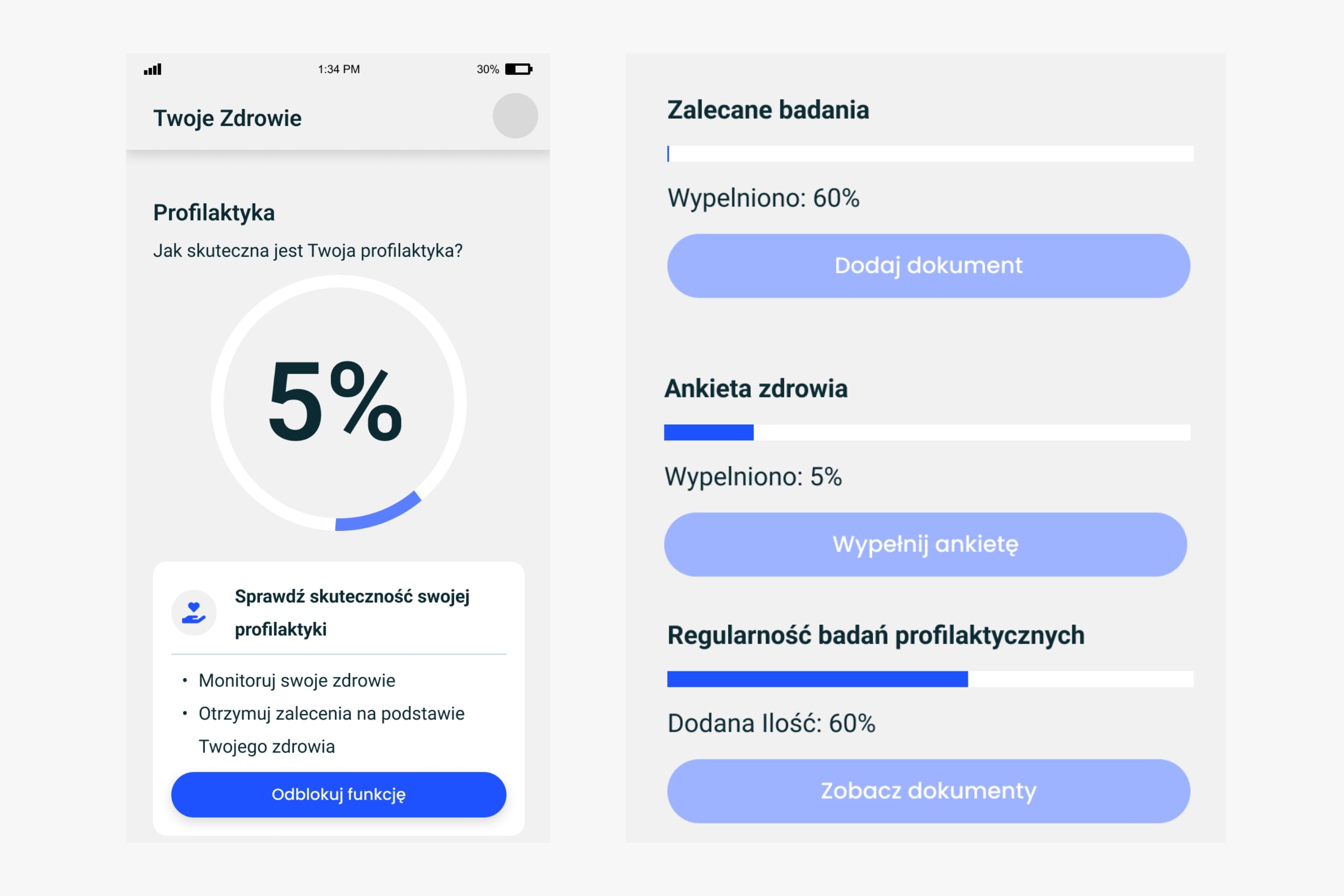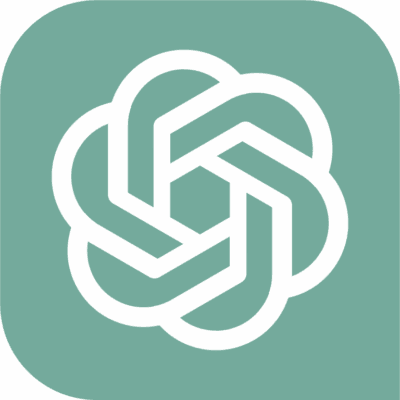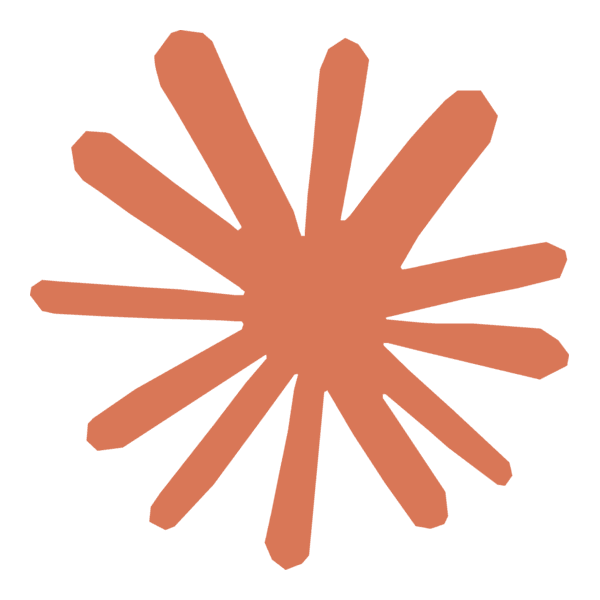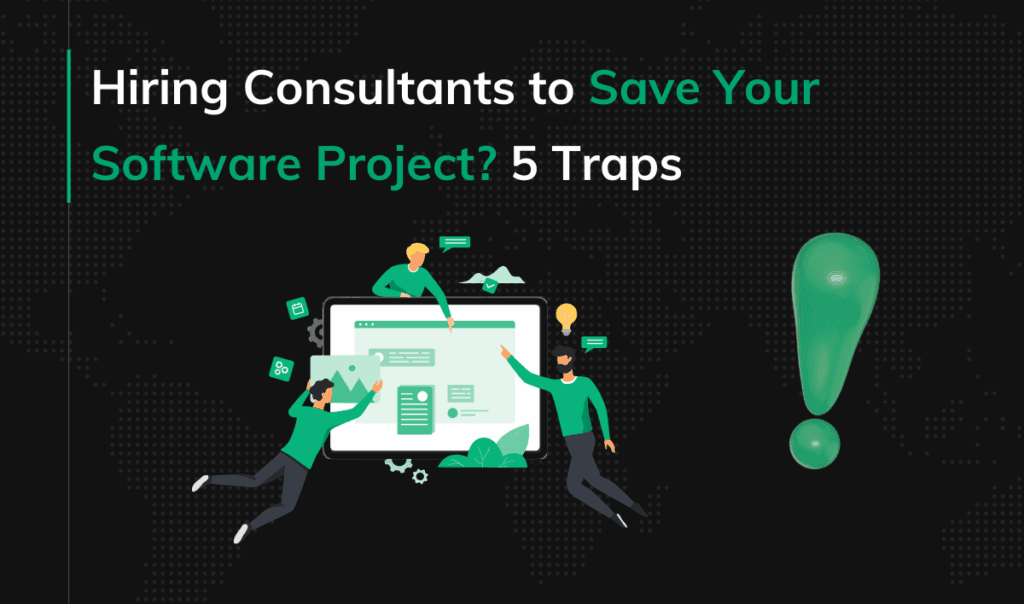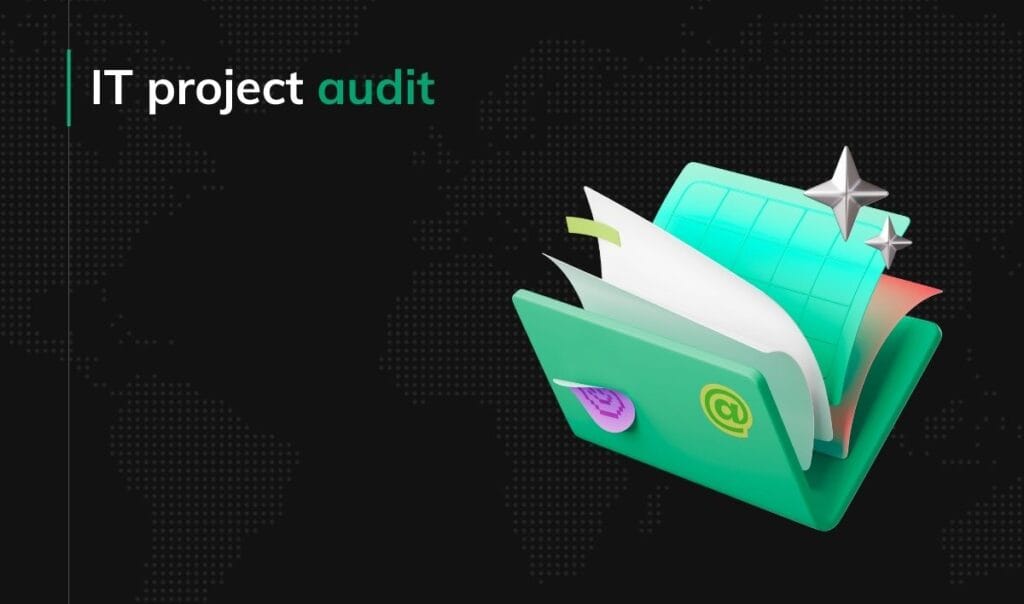Gamification in healthcare: Short guide for app founders
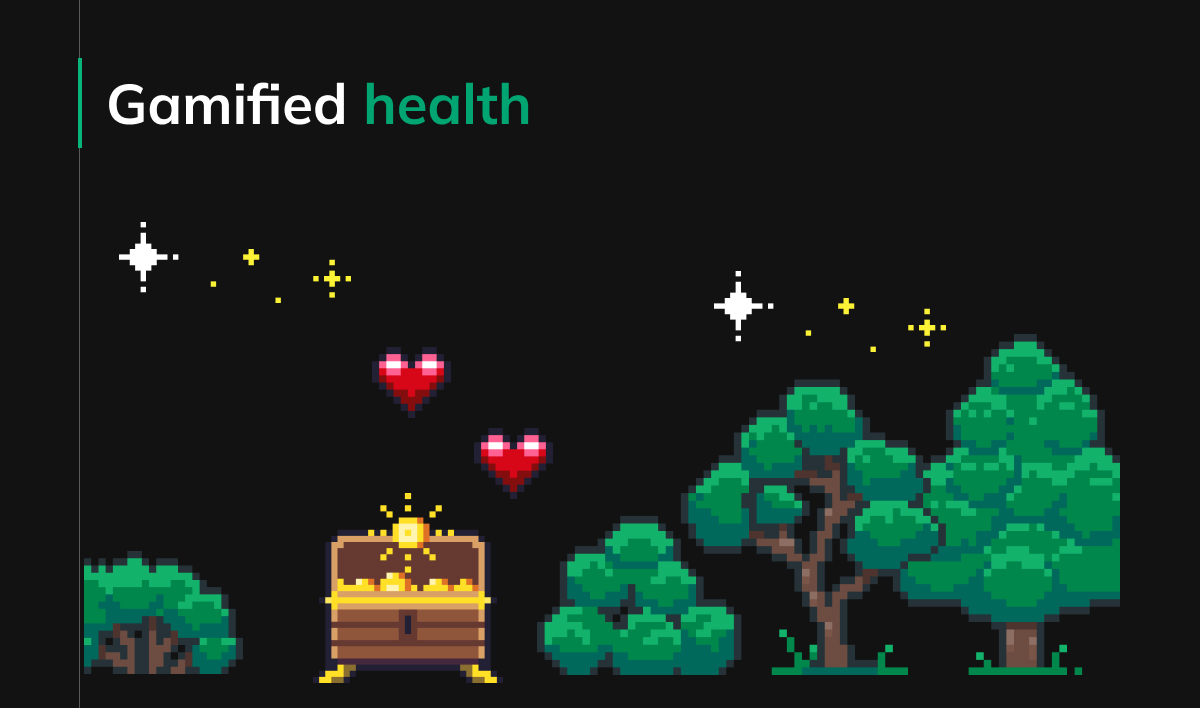
What if managing diabetes felt like fun? This is gamification—a strategy that uses game-like elements to make everyday tasks more engaging. While gamification has long been present in sectors like education, it’s making waves in healthcare software development, too.
This is a beginner-friendly guide that breaks down the core concepts of healthcare gamification into 5 easy-to-understand parts. Read now.
BTW, here’s a similar guide to gamification in banking.
Check our guide for a step-by-step instruction on how to implement gamification into your business.
1. What is gamification & how it works
You’re using an app to manage your health. Each time you take your medication on time, you earn points. You see a progress bar filling up, pushing you closer to your next reward—a badge for consistency or perhaps a discount on your next prescription.
This is gamification—adding game-like elements like points, badges, and leaderboards to make activities more engaging.
There are quite a few reasons why gamification works. Most, if not all of then, have to do with fulfilling our core needs. So, here’s a little bit of game psychology (and then we’ll move on):
- Self-determination theory suggests we have three core needs: competence (feeling skilled), autonomy (feeling in control), and social relatedness (feeling connected). Gamification can address these by offering challenges that build mastery (competence), choices in how to approach tasks (autonomy), and badges/leaderboards that foster connection (social relatedness).
- Motivational triggers: Gamification pulls from various motivational theories. Points, badges, and leaderboards provide extrinsic motivators (external rewards), while completing challenges and mastering tasks can cultivate intrinsic motivation (internal satisfaction).
- Positive reinforcement: Like operant conditioning, gamification rewards desired behaviors (completing tasks) with points, badges, etc. This way, it strengthens the positive association with the activity and increases the likelihood of repeating it.
Game mechanics in (healthcare) apps
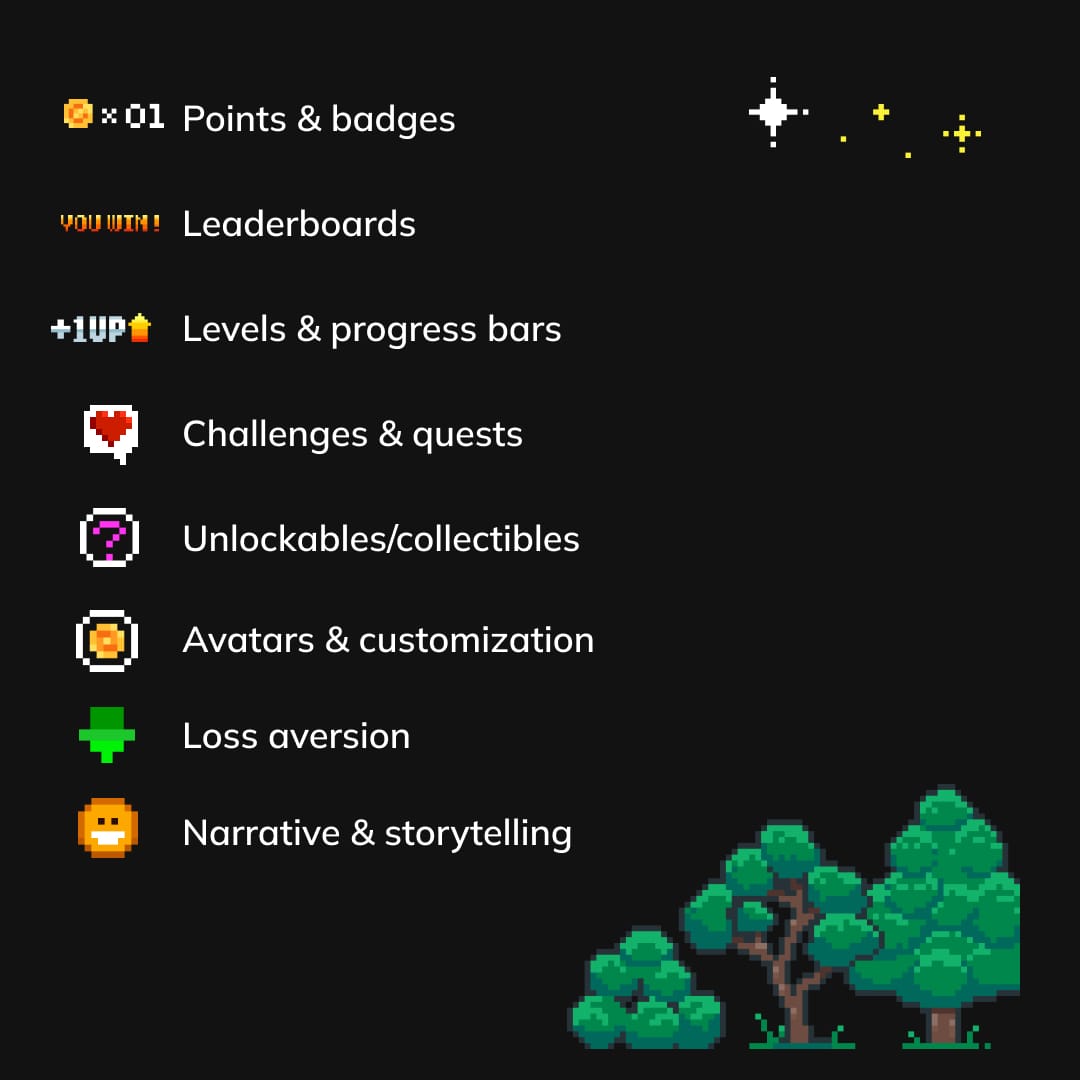
The range of game-like mechanics to implement in an healthcare app is vast; it can include both simple activities like progress bars to more sophisticated techniques, like storytelling. Here’s a list of the most popular way gamification can be used.
Points & badges: Just like in games, points can reward desired actions in non-game settings. Earning points can then be tied to badges that visually represent achievements.
Leaderboards: Friendly competition can be a great motivator. Leaderboards can showcase users’ rankings based on points, scores, or completed tasks.
Levels & progress bars: A sense of advancement is key to staying engaged. Levels and progress bars visually represent movement towards a goal.
Challenges & quests: Short-term challenges add bursts of motivation and a sense of accomplishment. These can be daily or weekly challenges that encourage focused effort.
Unlockables/collectibles: The ability to unlock new features or content keeps users engaged and striving for more.
Virtual rewards: Not everything needs a real-world reward. Virtual rewards like trophies or digital stickers can add a sense of accomplishment and recognition. These can be displayed on user profiles or dashboards.
Avatars & customization: Allowing users to personalize their experience fosters connection and investment. This can involve creating avatars or customizing profiles with earned badges or unlocked items.
Loss aversion: People dislike losing progress more than they enjoy gaining it (as you can see, it’s all about psychology, again). Mechanics like “streaks” (e.g., maintaining a daily exercise streak) can leverage this to promote continued engagement.
Narrative & storytelling: Weaving a narrative into the experience adds context and meaning to user actions. Fitness apps might incorporate storylines where users progress through challenges to defeat a virtual villain representing unhealthy habits (or run away from 🧟, more on this later on).
2. Benefits of gamification in healthcare
Let’s suppose you want to create a health app. You might be asking yourself: “Do I even need to use gamification?” Well, it comes with some benefits you might be interested in. Gamification in healthcare can make managing health fun, improve data collection, and lead to better health outcomes.
Improve patient engagement
Gamification makes various tasks less of a chore and more of an enjoyable activity. When a seemingly daunting activity feels like playing a game, you’re more likely to stick with it. For example, Verizon Wireless gamified its site and gets 30 percent more logins.
Improve data collection
Gamification encourages users to track and share their health data. This can provide valuable insights for healthcare providers, and allow them to personalize treatment plans and monitor patient progress more effectively.
Enhance healthcare outcomes
Getting involved in managing their own health can help people get better results. In an episode of McKinsey on Start-ups podcast, Dr. Tryggvi Thorgeirsson, CEO of Sidekick Health, an Icelandic company that uses games to help people manage chronic diseases, shared some interesting findings about their product.
- We have seen lots of different types of outcomes through different randomized clinical trials (RCT) and live data with our partners. We’ve seen in obesity that people are three times more likely to achieve their weight loss goals when using our platform as opposed to standard care alone. In a study that came out last year, Type 2 diabetes patients receiving full care who were additionally supported by Sidekick over a period of six months experienced a significant drop in HBA1C, which is the long-term blood glucose. And the drop that we saw was not just statistically significant, but clinically significant, and translates to about 16 percent less risk of death from diabetes, and about 30 percent less risk of complications like amputation and blindness.
- We really do see a strong impact on those types of hard clinical outcomes. But equally important is we see a positive impact on mental health and quality of life. For example, in the diabetes study, we saw 40 percent improvement in a score that measures disease-specific distress, based on questions like, “Do you feel discouraged, alone, or depressed about your condition?” We also saw a 24 percent reduction in scores for anxiety and depression in those same patients.
3. Examples of gamified healthcare apps
Below, I’ve compiled a list of gamified apps from the healthcare industry.
Gamified healthcare apps use elements like badges, challenges, and stories to make activities like fitness tracking, medication reminders, and even medical education more engaging. There are also apps that are basically games themselves.
Interestingly, as I was doing my research, I noticed there are types of apps that dominated the list. So, it’s important to notice: digital health is a big, multi-sector market, and there are areas where you’re way more likely to have game elements implemented.
What types of health applications can benefit most from incorporating gamification elements?
I found that these types of health-related apps are most likely to be gamified:
- Personal health management apps (fitness & nutrition tracking, sleep monitoring, mental health and wellness–especially popular with Gen Z)
- Digital therapeutics (DTX) apps for kids (apps that deliver evidence-based therapeutic interventions to treat, manage, or prevent medical conditions, and are subject to regulatory oversight and clinical trials).
- Medical education apps
Why? These areas benefit significantly from increased user engagement and motivation. Gamification encourages consistent behavior changes, such as exercising regularly, eating healthily, or practicing mindfulness. These apps often involve setting and achieving personal goals, which gamification can make more engaging and rewarding.
In contrast, telehealth and EHR apps, for example, are more focused on delivering clinical services and managing patient data, where the primary goals are accuracy, privacy, and efficiency rather than engagement through gamified elements. I’m not saying it’s impossible to integrate gamification into them, but it’s not this obvious.
Eating habits apps
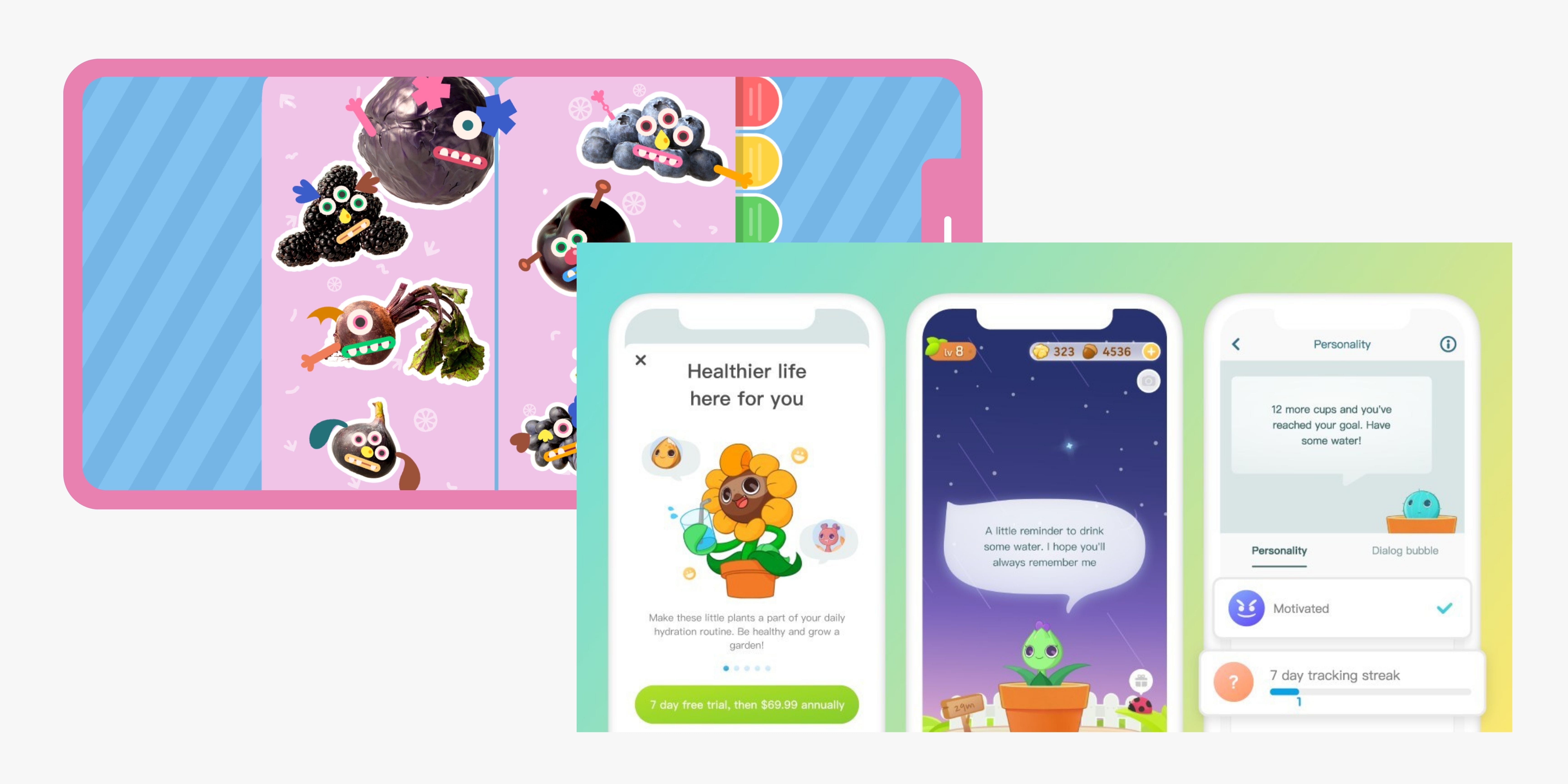
Plant Nanny is a water tracker and drink water reminder game. Users create customizable plant avatars that flourish or wither depending on their water intake.
Adventurous Eating Game, on the other hand, is an app for parents tired with their little picky eaters. The app encourages children to eat more fruit and vegetables.
EXAMPLES OF GAMIFICATION TOOLS USED: Narrative & storytelling, progress bars, day streak, avatars & customization
Fitness apps
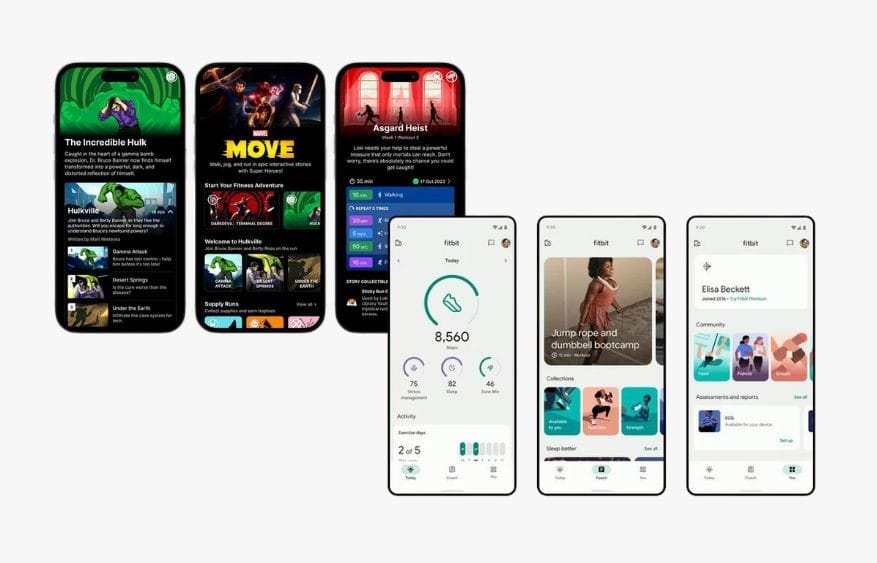
Fitbit is a wearable fitness tracker brand that monitors various health metrics such as steps, heart rate, sleep quality, and physical activity to help users improve their overall wellness. They redesigned their app, but some things are left untouched, such as gamification features: badges, goals, or progress trackers.
With Zombies Run + Marvel Move, you get motivated to move by audio storytelling that draws you into the zombie apocalypse or epic super hero adventures.
EXAMPLES OF GAMIFICATION TOOLS USED: Narrative & storytelling, collectibles, progress bars, badges
Mental health apps
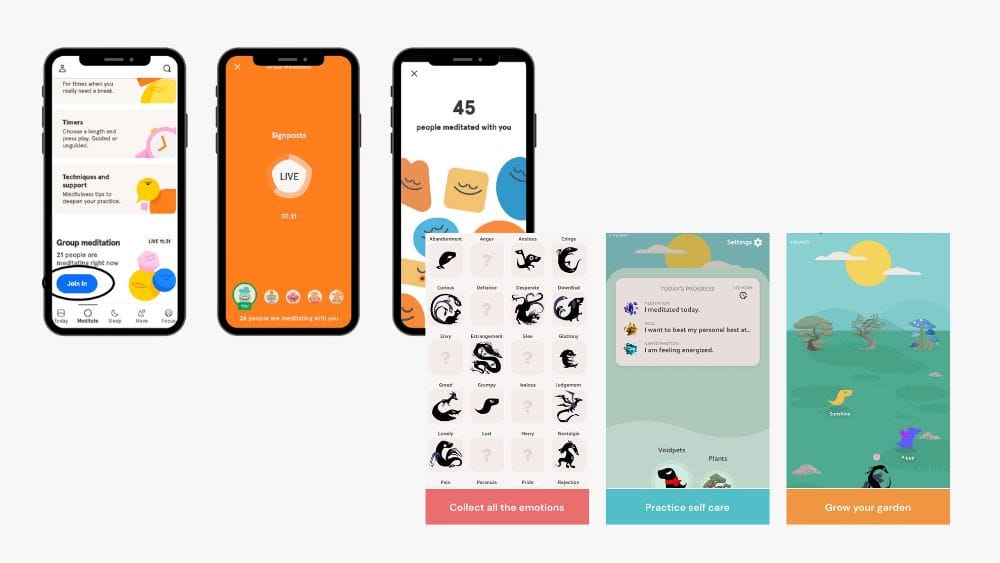
Headspace, a meditation and sleep app, offers guided meditations, sleepcasts, and mindfulness exercises to help users reduce stress, improve sleep, and focus. Interestingly, you can even join live group meditation classes, which plays into the social relatedness aspect of real-time games. Voidpet Garden is a mental health game where you collect and care for creatures representing your emotions in a virtual garden.
EXAMPLES OF GAMIFICATION TOOLS USED: levels, progress bars (My progress feature in Headspace), goals & challenges
Pill reminder apps
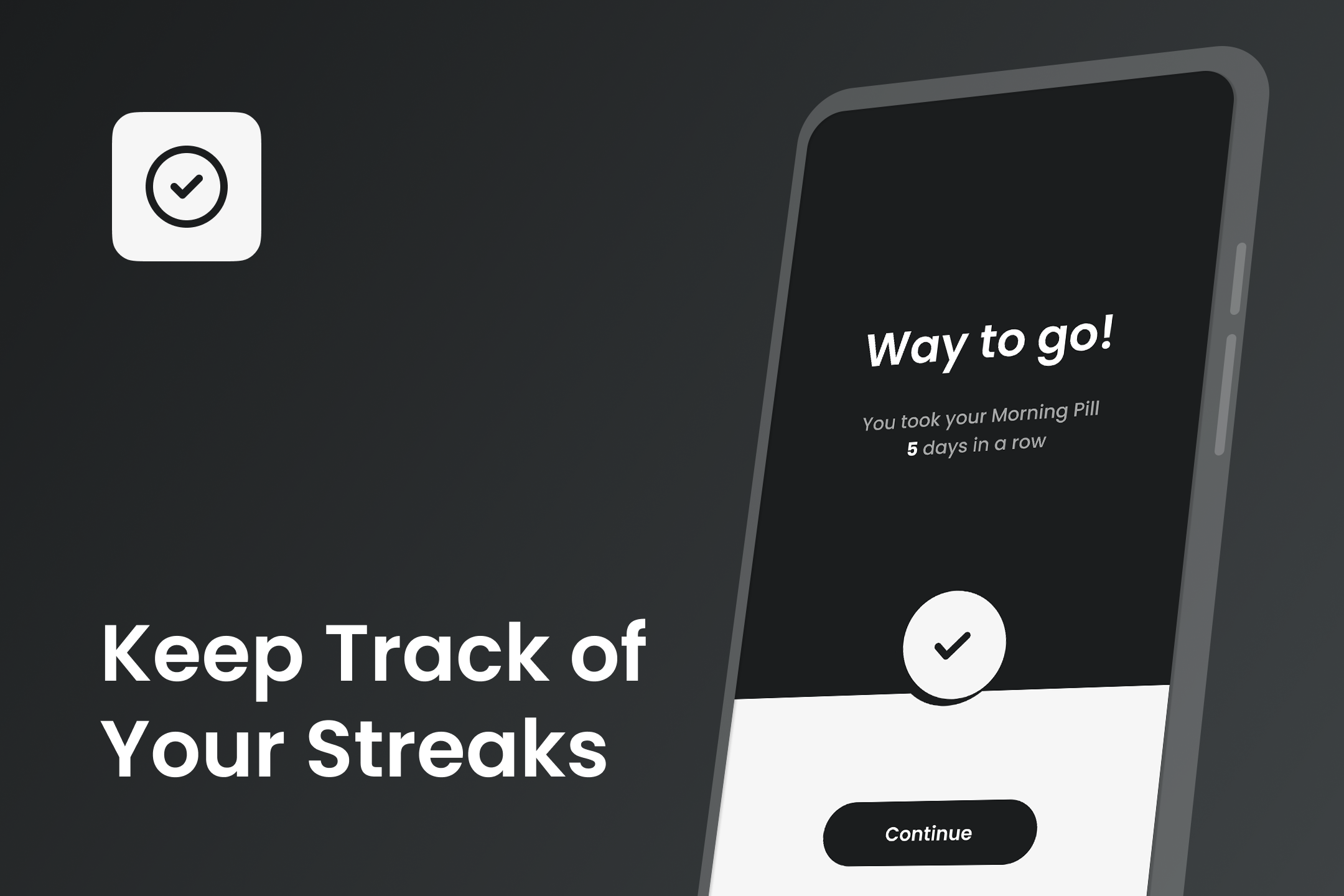
My Pill Reminder is a simple app that reminds you to take your pills with a little bit of gamification inside to keep you motivated.
EXAMPLES OF GAMIFICATION TOOLS USED: daily streak
Diabetes tracker logs
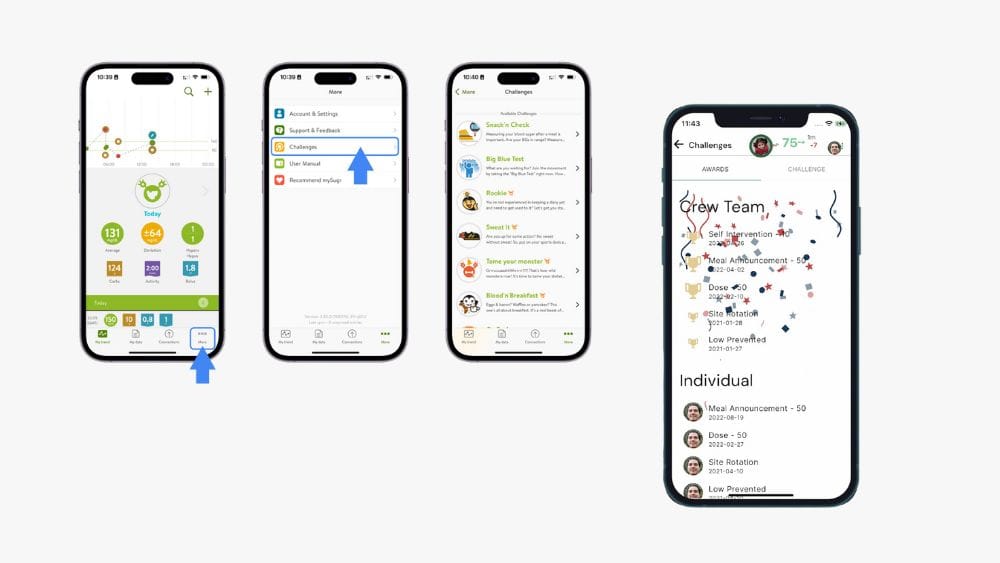
Managing diabetes can be overwhelming, but MySugr and Gluroo make it manageable and fun. Gamification features that let you challenge yourself or your team and win encourage users to keep using the app.
EXAMPLES OF GAMIFICATION TOOLS USED: challenges, charting, stats, trophies
TDTX apps for kids
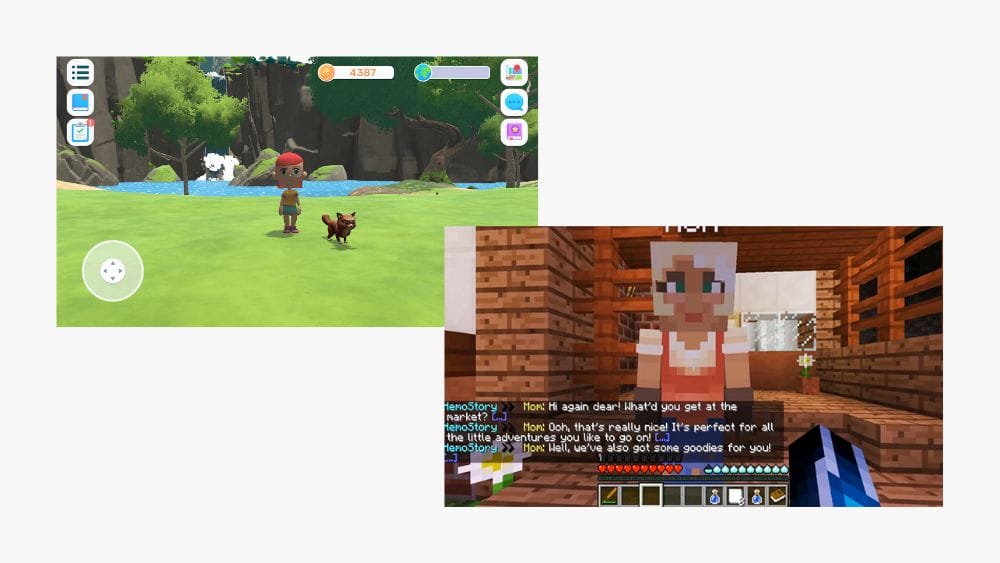
Triumf Health is a digital therapeutics app for children delivered through a mobile game to improve their mental wellbeing and quality of life.
Developed by Pfizer, Hemocraft teaches children with hemophilia the importance of following treatment plans by creating a simulated environment where they can learn about their condition and how to handle emergencies before help arrives.
Medical student training
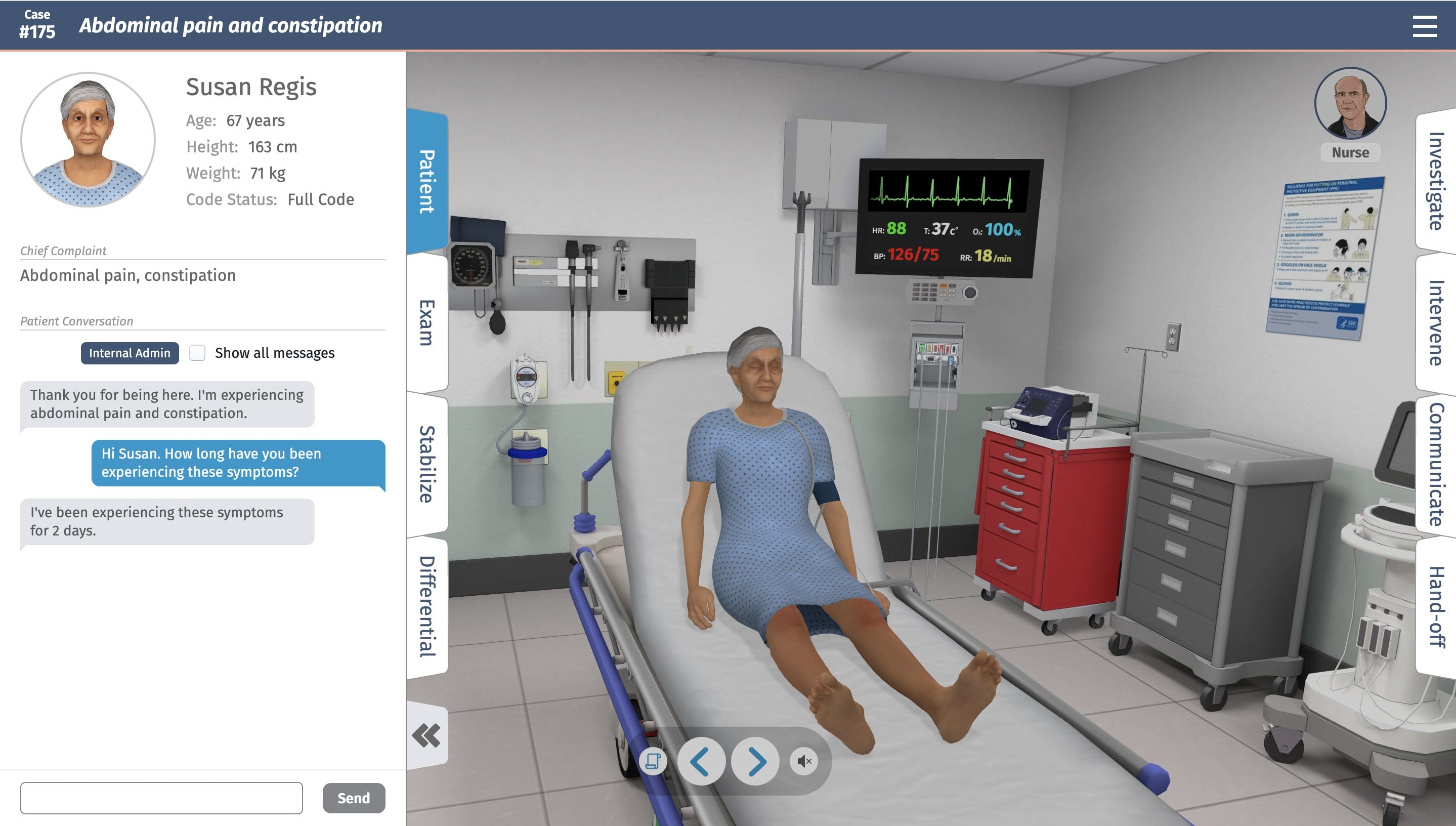
Full Code is a mobile-first simulation app designed by medical experts, with over 190 realistic virtual cases and an engaging, gamelike interface. It’s designed to help (future) medical professionals learn and hone their skills, no matter whether they’re just getting ready for the first year of medical school, preparing for residency, or simply expanding their existing skill-set.
4. Gamifying healthcare apps: Expert insight
I spoke with Wiktor Żołnowski, CEO and Founder of Health Folder, a medical documentation management app, to get his insights on gamification in the healthcare industry.
The progress bars you can see on the mockups below are just one example of future game-like elements in the product:
5. Dark side of gamification
As already mentioned, while gamified healthcare apps offer numerous benefits, they’re not without its challenges. The challenges of gamification in healthcare include user stress, privacy concerns, and potential for burnout, especially for those with poorer health.
The 2021 study on gamification in the context of health management explores the negative impacts of gamification in health management, particularly focusing on stressors and strain. Gamification elements like competition and interactivity are linked to privacy invasion and social overload, leading to gamification exhaustion.
The research found that users with poorer health conditions are more likely to experience these stressors. While gamification can motivate users, it can also lead to user fatigue and reduced app usage.
Conclusion. Gamification in healthcare apps
Incorporate gamification elements into your mobile app, and you can create a more engaging and motivating experience for users. This, in turn, will lead to improvements in patient outcomes, fostering healthy behavior, and making users stick to their health goals. You just need to be mindful of the potential negative aspects gamification techniques can come with if not well-thought-out.
Want to design and develop a gamified health mobile app? Check our healthcare app development services.

